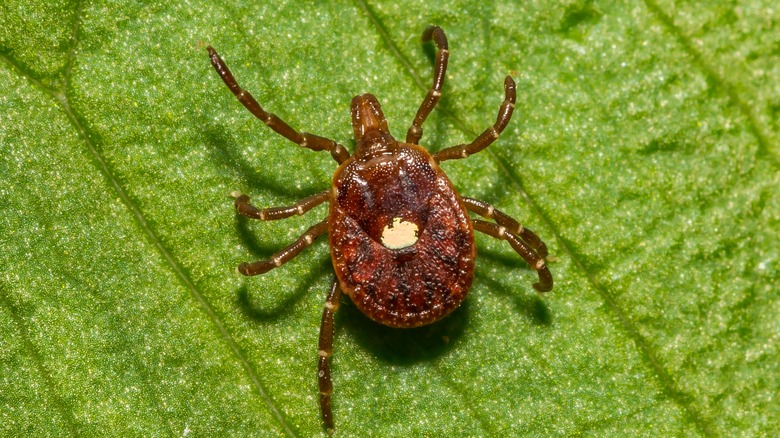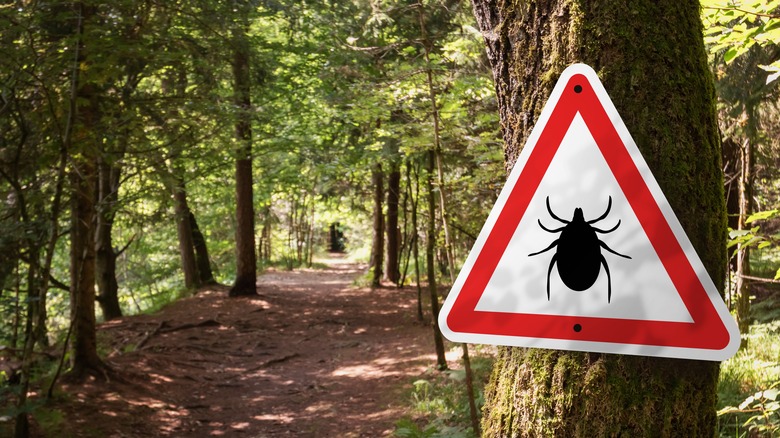Travel Guides Outdoor Adventures Camping
Matt Berry
Camping out and taking daily hikes is a great summer adventure. Unplugging to commune with nature by exploring new ecosystems and “roughing it” can be the ideal way to recharge the mind, body, and spirit. But, if you’re an avid camper, hiker, or generally outdoorsy, you’ve probably come across ticks, and these little bloodsuckers can quickly drain the joy from your nature bath. While we’re typically cool with all living things, ticks are gross, especially when they’re gorging on your heart-pumped blood. But more than a nuisance (and gross), ticks are also dangerous.
Along with potentially carrying a few other nasty diseases, such as Rocky Mountain Spotted Fever (that can kill you), ticks more commonly carry Lyme disease, which is no joke. Lyme disease can be treated by antibiotics, but the symptoms aren’t fun, and if left untreated, Lyme disease can affect your heart and nervous system. Fortunately, there are a few effective ways to avoid tick bites, and with a little diligence, you can ensure a safe outdoor experience for you, your camping party, and your pets.
Try to avoid tick-prone areas

Jay Ondreicka/Shutterstock
Ticks are found throughout the U.S., but the blacklegged tick variety, which is the carrier of Lyme disease, is particularly common in the eastern half of the country. While no hard-and-fast rule, these ticks typically like lower altitudes and warmer climates. It’s pretty impossible to completely avoid tick habitats if camping and hiking in these areas, but you can be careful.
A common misconception, ticks don’t jump on you like fleas, so if you avoid places where they hid out, you won’t give them a chance to crawl on you. Ticks really like tall grass and brush. When hiking, you can better avoid ticks by staying on maintained trails and resting on logs or rocks instead of the ground. Same idea for pitching camp. If you can, try to camp away from grassy areas and forest debris.
Before hitting hiking trails, we recommend wearing light-colored clothes to better detect ticks, as well as wearing long paints. Tucking your pant legs inside your socks and shirt into your waistband can help keep ticks from crawling through your clothing’s nooks and crannies.
Use the hard stuff for protection

Nick Alias/Shutterstock
For exploring the backcountry, staying out of tall grass, brush, and heavily forested areas may be impossible, but whether you stay on trails and designated campgrounds or not, your best defense against tick bites is tick repellent and insecticide.
Although you might usually prefer all-natural repellents, we’d recommend the hard stuff when dealing with ticks. The Centers for Disease Control (CDC) recommends products with at least 0.5% permethrin, which is actually an insecticide that’s safe for humans and dogs, but good at killing ticks and mosquitos. We recommend spraying your clothes, camping gear, and the area around the campground with permethrin. If you’re in a particularly tick-riddled area, you may consider purchasing permethrin-treated clothing and gear.
DEET is also a proven-effective tick-repellant, and we recommend spraying yourself and your gear with DEET fairly regularly (note that you should not use DEET with infants younger than 1). If you go camping with your dog, then you should treat them with tick and flee defense as well. They’re much more likely to sniff out all the areas where ticks hide.
Although taking these precautions will help, you’ll still need to check yourself, as well as any younger campers and pets, routinely. If you find a tick, it’s important to dislodge it ASAP to lower the chance of disease transmission. Tweezers and rubbing alcohol will do the trick. And once you return home, shower thoroughly and take that opportunity to better examine more intimate regions. As we said, ticks are gross.

